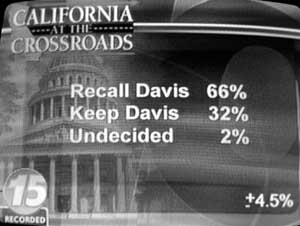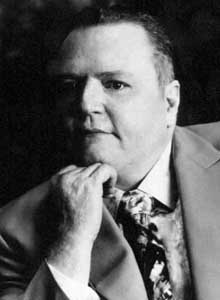-
- U.S. Episcopalians approve first openly gay bishop
- AIDS making a comeback in the U.S.
- Episcopal leaders deem same-sex union ceremonies acceptable
- Young lesbian’s stabbing death far from resolved
- NGLTF leader warns of backlash at annual Dignity meeting
- Group founded by gay bishop creates ‘safe space’ for teens
- Editor of GLBT paper appeals censorship ruling
- Probe continues into phone message accusing Arizona governor of gay agenda
- National News Briefs
- World News Briefs
feature
ACLU follows recall lawsuit with request for restraining order
Published Thursday, 14-Aug-2003 in issue 816
LOS ANGELES (AP) — The American Civil Liberties Union asked a federal judge to postpone the recall election, arguing that it will take until March to replace punch-card voting machines the group claims would disenfranchise thousands of Californians.
The ACLU of Southern California asked the judge for the temporary restraining order, or TRO, in a lawsuit that it filed Aug. 7 seeking to postpone the Oct. 7 election.
The suit contends the machines — which caused such furor over “hanging chads” in Florida during the 2000 presidential race — have an error rate of 2-3 percent and could leave many votes uncounted, especially those in heavily minority counties.
The machines currently are used in Los Angeles, Alameda, Mendocino, San Diego, Shasta and Solano counties.
“We know with certainty that tens of thousands of California voters will be disenfranchised if the election is not postponed,” said Ben Wizner, an attorney with the ACLU. A hearing date in the case has not yet been set.
Wizner pointed out the ballot will be especially complicated because so many candidates are seeking to replace Gov. Gray Davis. The secretary of state has received candidate applications from 247 people.
“This may make the Florida election, with its butterfly ballots, seem like small-time,” he said.
Liz Kanter, a spokeswoman for the secretary of state’s office, said the agency doesn’t comment on pending litigation.
Recall supporter Dave Gilliard, strategist for the group Rescue California, said he doubted the TRO would be granted.
“At this point, Californians expect, and every court has ruled, that there is going to be an election in October,” he said. “I don’t believe the federal courts will interject themselves into a state issue.”
A call seeking comment from the governor’s anti-recall campaign was not immediately returned.
The California Supreme Court last week dismissed a petition by Davis that also sought to postpone the election until March.
The ACLU hopes to build on a favorable ruling handed down in 2001 in a federal case that ended with California agreeing to replace punch-card voting machines with other devices by March.
More Democrats than Republicans among California’s 200-plus governor hopefuls
SACRAMENTO (AP) — More Democrats than Republicans have filed candidacy papers for the Oct. 7 recall election, even though the state Democratic Party had discouraged challenges to Gov. Gray Davis, a recent tally.
Ninety-five of the 247 are listed as Democrats, the secretary of state’s office said. Seventy-seven are listed as Republicans, 58 as independents, six Green Party members, four Libertarians, three American Independents, two Natural Law Party members and two Peace and Freedom candidates.
Of the candidates, 115 have been completed for certification and the rest were being reviewed, according to the secretary of state’s web site. The 115 include 45 Democrats and 33 Republicans.
The most prominent Democrat is Lt. Gov. Cruz Bustamante, who is being promoted by party leaders as the most desirable Democrat if Davis is recalled.
The leaders had originally urged all prominent Democrats to sit the Oct. 7 election out, in order to boost Davis’ survival chances. Voters will be asked to vote “yes” or “no” on recalling the governor, and then to choose who should replace him if the recall measure passes.
Also Tuesday, former presidential candidate Ralph Nader said he would endorse fellow Green Party member Peter Camejo for governor. Camejo captured 5.3 percent of the vote for a third-place finish in last fall’s race for governor.
Staging the election is posing major challenges for county elections officials, who fear problems with processing such a large ballot, including doing more work by hand.
Secretary of State Kevin Shelley urged precision over speed when polls close on Oct. 7.
“I urge them to do it accurately,” he said. Officials have said it could take several days to finalize results.
On Monday, state election officials randomly drew letters to determine the order of the recall ballot.
The first letter pulled out of the Keno-style tumbler: R. Under the lottery-style system, the reordered 26-letter alphabet — beginning R, W, Q, O, J, M, V, A and eventually ending with L — is applied throughout candidates’ names.
That means that David Laughing Horse Robinson, chairman of the Kawaiisu Indian tribe, will be first on the ballot in California 1st Assembly District, which stretches from the northernmost border to Sonoma County.
To avoid giving any one candidate a lasting edge, the names are rotated in the state’s 79 other Assembly districts. In Assembly District 2, Robinson’s name will drop from first to the bottom of the list. Every other candidate will shift up one position, giving smokers’ rights advocate Ned Roscoe the top spot.
With only 80 Assembly districts, candidates who fall below 80th in the initial alphabetical selection process will not be No. 1 in any district.
Hustler magazine publisher Larry Flynt and former Major League Baseball Commissioner Peter Ueberroth, whose initials pulled 25th and 21st respectively, could fall into that category.
The precise order and its potential ramifications won’t be known until late Wednesday, however, when Shelley certifies how many candidates actually qualified for the ballot.
The state has used the alphabet lottery to list candidates since 1975 to help erase the estimated 5 percent advantage a candidate gets from being at the top of the ballot, Shelley said. The sheer number of candidates vying to replace Davis turned the routine process into a grab bag.
The letters H, B and S were drawn eighth, ninth and 10th, meaning that some high-profile candidates — Bustamante, actor Arnold Schwarzenegger, 2002 GOP candidate Bill Simon and commentator Arianna Huffington — will be relatively near each other on most ballots.
A greatly expanded ballot means higher costs for the special election, now estimated at up to $66 million. Contra Costa County elections officials said the long candidate list could raise ballot costs by $750,000 over the county’s earlier estimate of $1.6 million.
Shelley promised Monday he will ask for help.
“To assist the counties, I intend to urge the Legislature to underwrite the added costs of this election,” he said.
The California State Association of Counties, noting the state has typically paid for special elections, also intends to seek legislative relief.
Shelley said the state’s planned share of the costs ballooned from $7 million to $11 million because a short time frame will require first class stamps to mail 11 million sample ballots. Normally, the pamphlets are mailed at a lower postage rate that takes more time for them to be delivered.
With each candidate allowed to make a 250-word statement, the pamphlet could be 50 pages long.
“It’s like we’re spending next month’s rent, or grocery bill,” Michael Petrucello, assistant registrar for Los Angeles County, told the Los Angeles Times. Election costs in that county are expected to reach $13.2 million.
|
|
Copyright © 2003-2025 Uptown Publications



